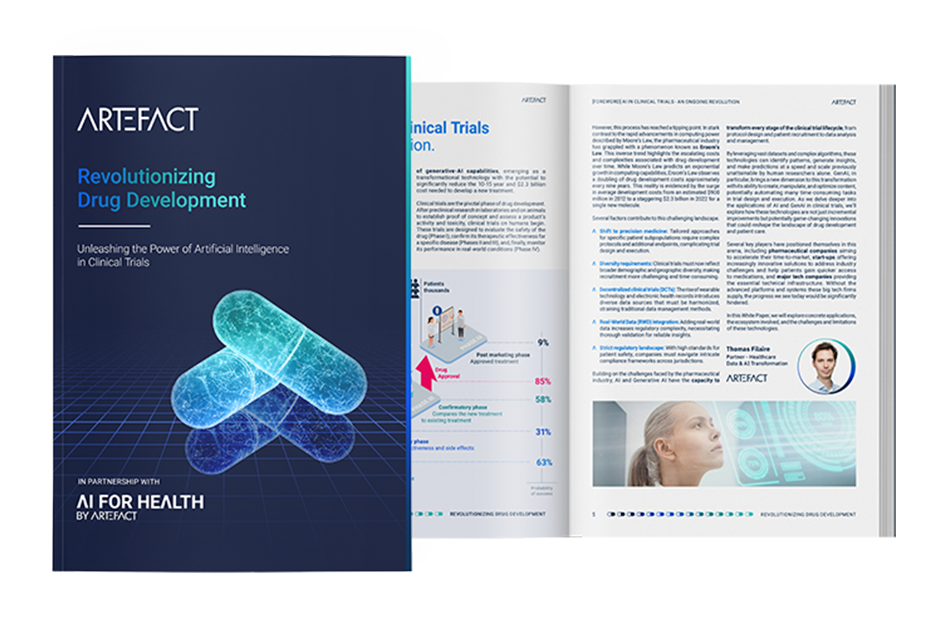Healthcare : a strategic sector for Artefact.
Justine Nerce is one of the pioneers of Artefact, which she joined in 2016. She was at the heart of the creation of the healthcare practice, driven by a passion for this meaningful sector, rich in innovation. The beginnings were initiated by a collaboration with a customer determined to leverage its data across the company’s entire value chain.
Today, Artefact’s healthcare practice has over 100 experts worldwide, with annual growth in excess of 50%, and works with more than 30 customers in the sector, covering a wide range of issues, from optimizing pharmaceutical R&D, through improving care pathways, to improving supply chains, and more.
IA use cases as acceleration of business transformation
CPU #1 – Accelerate the development of new treatments
Therapeutic innovation is a complex and costly process. It spans an average of 12 years, from exploratory research into understanding diseases, through clinical trials, to market authorizations. With patents valid for only 20 years, time-to-market is crucial to a drug’s profitability.
Research costs are very high: on average, out of 10,000 molecules studied, only 100 are tested, and only one reaches the market.
There are many AI solutions for optimizing the therapeutic innovation process, including :
- Target qualification: centralization and exploitation of information in dedicated tools, highly advanced real-time dashboards for precise decision-support analyses.
- Pre-clinical testing: automatic, ultra-fast generation of documents such as brochures for physicians, or the drafting of clinical protocols.
- Market access facilitated: AI tools generate and synthesize critical documents for Marketing Authorization applications.
UC#2 Reducing drug shortages with data and AI
The pharmaceutical supply chain, from production to delivery, must guarantee the availability and safety of medicines. In 2023, 37% of French people said they had experienced a shortage. Thanks to AI, numerous optimizations can be envisaged:
- Data provides better visibility of stocks and traceability at every stage.
- AI optimizes demand forecasting and improves real-time decision-making, reducing costs and lead times.
- Predictive maintenance can be enhanced thanks to IoT sensor data.
- Disruption mitigation scenarios reduce risk and waste.
UC#3 – Democratizing access to healthcare thanks to data
Lack of access to medical data undermines the reliability of diagnosis and treatment of certain diseases, such as CKD (chronic renal failure), which affects 10% of the French population and costs €13.76 billion a year (forecast for 2027: around €16.99 billion).
Concrete solutions provided by Artefact to customers in the sector, helping to improve access to care:
- Identification of areas in difficulty using real data and partnerships (e.g. INSEE). Expected results: reduced disparities, better information for doctors and optimized reallocation of resources.
- Use of Machine Learning to provide sales teams with a personal assistant capable of managing large quantities of rich, complex information. In this way, they can optimize their decisions thanks to systems that personalize interactions with healthcare professionals (HCPs).
Justine gives her take on the most promising data and AI innovations in healthcare.
Justine talks about the 4 pillars of pharma innovation that create value and improve the quality of patient care.
- Mix Channel Modelling: improving the omnichannel experience of healthcare providers or patients, by investing in the communication channels (conference, newsletters, emails, etc.) that appeal most to these populations depending on the subject matter, thus guaranteeing optimization of marketing ROI.
- Forecasting across the entire value chain: from demand forecasting, production planning, sales and marketing forecasting, to R&D with early target identification.
- Generative AI in R&D: Generative AI can improve certain time-consuming and difficult R&D processes, such as the drafting of regulatory documents, with a 30% reduction in the time required. Generative AI also speeds up access to information on past clinical studies (available in particular on clinicaltrials.org) and the ability to define protocols for future trials.
The result: a more agile, efficient and innovative industry, focused on better patient care.
But it’s best to listen to this video in its entirety, in which Justine Nerce explains in concrete terms all the potential for AI transformation in healthcare and pharmaceuticals, within an ethical, regulatory and secure framework that is critical in this sector.
Artefact study – “Revolutionizing Drug Development: Unleashing the power of AI in clinical trials”.

This comprehensive guide dives deep into how AI is transforming the clinical trial landscape—making trials faster, more efficient, and more inclusive.
What’s inside? It is composed of 4 main chapters:
- [Foreword] AI in Clinical Trials – An ongoing revolution
- Real-world impact – Get a closer look at transformative AI use cases across the clinical trial value chain
- Fueling Innovation: Exploring the expanding ecosystem of AI-driven trials
- Challenges Ahead: Overcoming barriers to fully realize AI’s potential

 BLOG
BLOG






